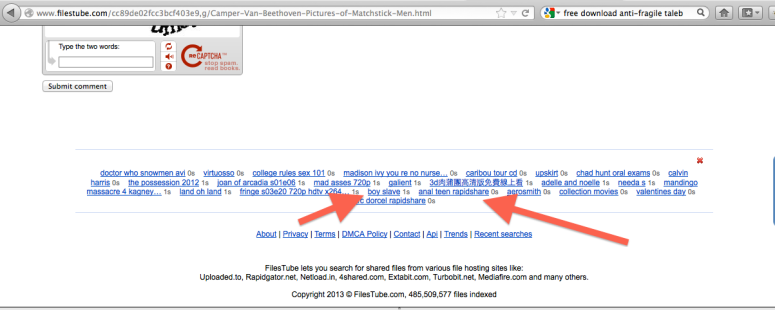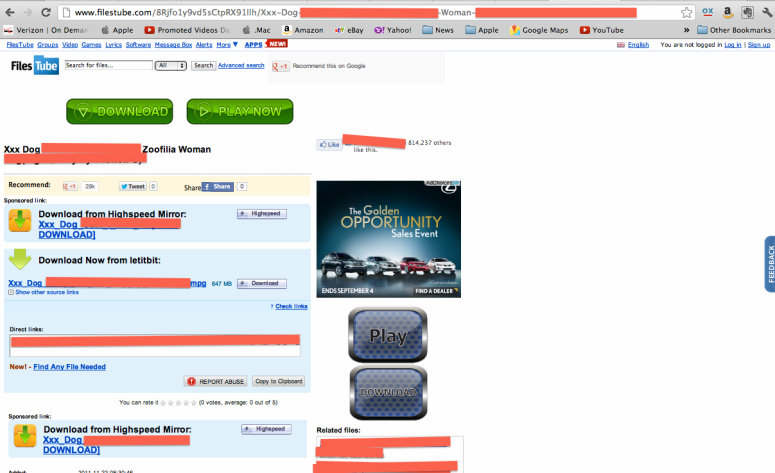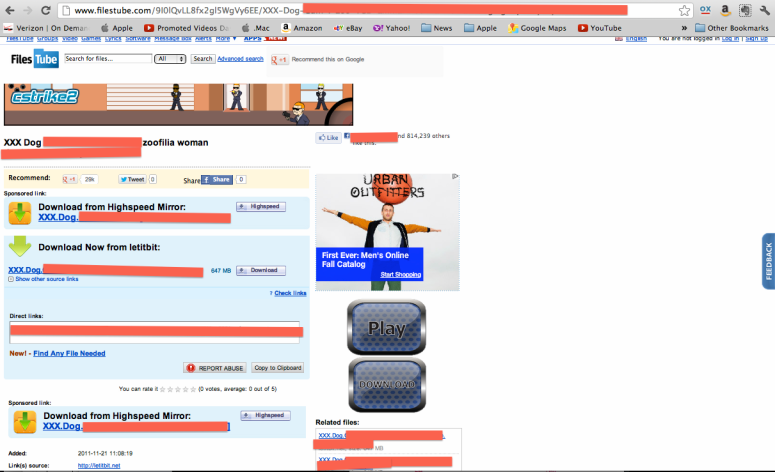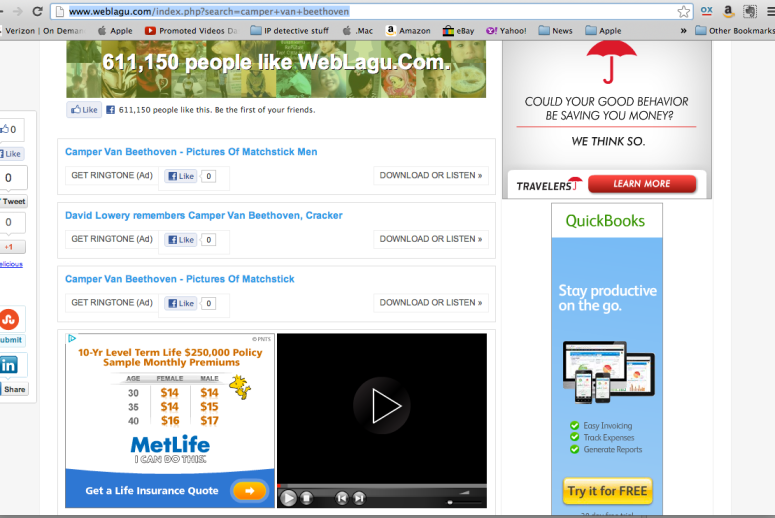An Elegant Non-Denial And It’s Implications.
We previously noted that USC’s Annenberg Innovation Lab released a report detailing their initial observations regarding the top online advertising networks that appear to facilitate the payment of advertising revenue to sites that exploit artists without compensation, i.e., pirate sites.
In the 1950s, record labels (often controlled by shady figures of legend and myth) exploited songwriters and artists without compensation. When artists complained, the label might give the artist a Cadillac in lieu of their royalties. When we hear these stories about how some of the music moguls from those days exploited artists we are rightly outraged.
Today, sites like The Pirate Bay, Hotfile and Isohunt exploit artists in a similar way except the artists don’t even get the occasional Cadillac. And not many people seem outraged. In fact journalists (like this Spin Magazine writer ) seem to want to romanticize the operators of these sites as folk heroes. Instead of portraying them as they truly are: sleazy opportunists and scam artists waving the banner of “freedom” while they rob artists blind. The really sad part is “respectable” Fortune 500 companies seem to be complicit in this racket. By advertising on these sites, these otherwise respectable companies fund these illegal operations that exploit artists.
But there is good news. At least one company, Google has accidentally admitted to being complicit in this racket. Well maybe that’s not quite right. Perhaps a better way of phrasing it is they simply didn’t categorically deny their involvement and invited us to read between the lines. Still I’m taking this as an admission the industry has a problem. And admitting you have a problem is the first step to recovery. Even if it’s only a read-between-the-lines kind of admission.
The reason I say this is because Google issued a curious and very carefully worded response to the USC report. I am quoting from the LA Times reporting on the study.
“To the extent [the study] suggests that Google ads are a major source of funds for major pirate sites, we believe it is mistaken,” a Google spokesperson said. “Over the past several years, we’ve taken a leadership role in this fight. The complexity of online advertising has led some to conclude, incorrectly, that the mere presence of any Google code on a site means financial support from Google.”
I don’t know-perhaps I’m crazy but I think they did this purposely. There is almost a deconstructed free jazz beauty to this statement. It’s like they hired the Ornette Coleman of press releases. The melody is there, but it’s in the omissions, the implied notes, the silences and the negative spaces. And using a little mathematical logic you can reconstruct that melody. You can clearly deduce the statements that they specifically intended to not deny. Probably just so they couldn’t be accused of lying later. You follow my logic?
The four read-between-the-lines admissions are as follows.
1. Google is a source of some funding for some pirate sites.
“To the extent the study suggests that Google ads are a major source of funds for major pirate sites, we believe they are mistaken.”
Google is not denying that it is a source of funds for pirate sites. They are simply proclaiming (without evidence) that they are something less than a major source of funding. So they are a moderate source of funding? A minor source of funding? Just shy of being a major source of funding? Left unexplained is how Google can measure major versus minor funding and how Google has knowledge of the revenues generated by these illegal and mostly offshore sites.
2. Google funds pirate sites, just not the top 8 sites.
“To the extent the study suggests that Google ads are a major source of funds for major pirate sites, we believe they are mistaken.”
Read this sentence again. They are denying funding the “major” sites. But they are not denying they may be funding sites that they don’t (arbitrarily) consider major. Now in this case we were able to do a little reverse engineering to figure out the cut-off between major and non-major websites. As noted before on the Trichordist we have caught Google providing ads (and we can only assume revenue) to http://www.filestube.com. They admitted that filestube had an account and have since disabled it (thank you). According to web traffic analysis site http://www.Alexa.com there are only 8 file-sharing/cyberlocker type sites that rank higher than filestube! Google’s own transparency report names http://www.filestube.com as the #1 recipient of valid notices of copyright infringement.
Since Google is basically an engineering operation, you should consider it significant that it has implicitly created 4 quadrants for their involvement:
A. Major Funding For Major Sites
B. Less Than Major Funding For Major Sites
C. Major Funding For Less Than Major Sites
D. Less Than Major Funding For Less Than Major Sites.
They are specifically not denying that they may be operating in quadrants B, C and D. They are only denying that they are in quadrant A.
3. Google lacks sufficient corporate oversight to really know if they are providing funds to illegal sites or not.
“…we believe it to be mistaken.”
Note the use of the word “believe.” They are hedging their bets. They don’t really know. Google claims its mission is to “organize the world’s information” (whether the world likes it or not). How can a company that can organize the world’s information lack sufficient knowledge of their own data to know where they are sending revenue? Don’t they issue 1099s in accordance with tax laws? We can only assume that they are specifically not denying a lack of corporate oversight. Because the other possibilities are terrifying.
What are the other possibilities?
A. The online advertising network has grown so complex it is actually a sentient being. And like Skynet in Terminator movies, Google has lost control of it and it is now trying to kill us all. (I’d assign this a low probability, Google’s fascination with The Singularity notwithstanding.)
B. They do know where they are sending revenue. And if this is the case, Google shareholders may be in for another $500 million dollar fine, like the one they got in the illegal online pharmacy settlement.
For the sake of Google stockholders, lets just hope they are merely disorganized.
4. Google is not denying that their source code on pirate sites means that they have a financial relationship with these sites.
“The complexity of online advertising has led some to conclude, incorrectly, that the mere presence of any Google code on a site means financial support from Google.”
Read this very carefully. This is very, very clever. Or to keep using the Ornette Coleman analogy this is like the Science Fiction of this press release. It’s explosive, wild and takes a while to understand. No one is really clear why there is a recording of a baby crying in the middle of the saxophone solo. I’m sure it will confuse a lot of overworked underpaid journalists.
Note the words “some” and “any Google code”. By using the word “some” Google has set up a hypothetical “straw man” to knock down. For this statement to be true all they need is ONE example in which a pirate site contained any Google code (Google Plus, Google Analytics) and someone mistakenly thought Google was serving ads on the site. It’s a beautiful hypothetical and that seems to “explain” everything. When it really doesn’t. That’s a wild bit of science fiction. Or as one of my colleagues puts it “a totally unrelated story that cross-dresses as a reasonable explanation.”
So once again Google cleverly DOES NOT deny that when we see Google or DoubleClick ad code or publisher IDs on rogue websites this confirms a financial relationship with Google.
But perhaps most telling of all is Google’s description of the ad networks as “complex.” And I heartily agree. In the financial world there is an old adage “complexity is fraud.” That is honest markets and financial products tend towards simplicity. But in the online advertising world you have ever increasing complexity. This usually indicates there is some fraudulent aspect to the market. I believe that much of this “complexity” is there to simply insulate the big firms from illegal and unethical practices up and down the chain. Because complexity has a useful byproduct: deniability.
To be fair, it should be noted that the online advertising ecosystem was not created by Google alone. Other networks and the Madison Avenue agencies had a hand in creating this system. I find it very interesting that not one of the Madison Avenue agencies has anything to say about this report. Why the silence?
+++++++++++++++++++++++++++++++++++++++++
Transparency + Markets.
So my conclusion from all of this is probably not what you expect. I think Google and the other ad networks are unreachable on this matter and we artists shouldn’t waste time engaging them in a public relations battle. They would love to confuse us with sideshows about ad exchanges, open protocols, “self-serve accounts” and the complexity of the system. None of that really matters. What matters is that companies like State Farm and Amex show up on these sites. We artists need to focus on the brands that are advertising on the these sites and nothing else.
The other thing to consider. It is becoming ever more apparent that Google gets a form of “celebrity” justice when it comes to their wrongdoing. A minuscule $25,000 dollar fine in the Google WiFi snooping case? How did that happen? Or Friday’s mysterious FTC announcement that the Obama Administration won’t be pursuing an anti-trust investigation of Google. Google has too much clout in the political system. While it’s reported that Google’s PAC may have divided its contributions between Republicans and Democrats, its employees and executives overwhelmingly supported Democrats and Obama. The technology sector is one of the few industries that Democrats can rely upon to counter the Republicans’ advantage in corporate political donations. This gives me little hope that Washington will ever punish Google or any other tech company involved in the online advertising cesspool.
Now I’m not in favor of this sort of cronyism, I’d love to see Congress investigate these ad networks, especially Google. But ultimately I think it doesn’t matter. What matters more is that we shine a light onto these practices. This is the best way to attack the problem.
The silver lining is that companies like Google are helping us. Their protestations are inadvertently providing transparency into how the online advertising ecosystem truly functions: It’s out of control, un-reliable, and does not work as advertised. It may actually do harm to some brands. To paraphrase Chris Castle at Music Tech Policy: Online ad networks are Silicon Valley’s exploding Pinto. The mother of all product liability cases. I believe that as this information becomes widely known market forces will correct much of the problem, for there are clear financial incentives.
This will happen in two distinct but interrelated ways. Downward pressure on share prices and lower revenues.
The money starts with the Fortune 500 brands. We don’t need to know every single place where it ends up. We can see it in the screen captures. We don’t need to follow the money to every Vladmir and Constantin running a pirate site. We just need to cut off funds at the source. And transparency is the most effective AND easiest way to do this.
As Fortune 500 firms become aware of how these ad networks really work, brands will abandon the “bad” networks reducing their revenue, or force the “bad” networks to change their practices. Either way funding for these sites should drop.
Part of the reason I’m so optimistic is that I’ve discovered that it’s really pretty easy to get a bad network in trouble with its clients. Let me demonstrate. Virtually every illegal file-sharing and/or “cyber locker site” will auto-suggest “recently downloaded” or “popular files”. Every once in a while they suggest files that appear to be illegal pornography. The site http://www.stopfilelockers.com explains this in detail. But as an example even this innocuous search for “camper van beethoven pictures of matchstick men” on a site like http://www.filestube.com immediately autosuggested some very sketchy links at the bottom of the screen.
And because these sites are completely unregulated eventually something really embarrassing happens to a major brand. Like this real screenshot I captured earlier this fall:
“Bestiality brought to you by Lexus.” For their “The Golden (Retriever) Opportunity Sales Event” advertising campaign
And the same thing happened to Urban Outfitters. Although honestly I really can’t be 100% sure this isn’t intentional. You follow me? This may be some high level extreme branding. You never can be sure with a brand that uses a litter box with cat poop spelling out “2013” for it’s web catalogue. Not kidding.
Transparency + Markets is quite a wonderful thing. Isn’t there now a high probability that someone at an ad agency or an entire ad network somewhere gets fired over these two screenshots? The ultimate effect is that it reduces revenue to http://www.filestube.com.
But even more interesting is that the publicly traded companies that operate ad networks, like Google, Microsoft, Yahoo and ValueClick expose themselves to civil and criminal liability by doing business with these websites. What happens if one of these networks get caught up in a RICO investigation? What happens to the share price?
Many of these websites pay “affiliates” money for uploading popular files. In the case of MegaUpload I’d imagine many of these affiliates are in the US. Do you really think MegaUpload sent 1099’s to these people? Do you think these affiliates declared this income on their taxes? What happens to one of these ad networks when they get caught up in a US tax evasion investigation? You do realize that the US Government is likely in possession of this data?
What happens when a major brand like Ford that doesn’t want their ads on these sites sues the ad network for a refund? What happens if hundreds of brands sue the same ad network for a refund? what will happen to the share price? I’m told that at least the big ad agencies require the ad network to submit to a compliance audit that could allow some brands to receive refunds on commissions if their ads end up in the wrong places.
And finally for finance geeks:
None of these things even has to actually happen for share prices to plunge. The mere possibility that this could happen, the mere possibility that these companies have exposed themselves to large unpredictable downsides can drive the share price down. Influential stock analysts may notice these dangers and issue bearish warnings. But the more likely scenario in my mind is a large hedge fund may make a big bet that these dangers are “underpriced” and start buying puts on one or all of these companies. If it’s a large enough bet option market makers will have to sell short the stock to hedge potential losses. This drives prices down. Then “momentum” players begin short selling further depressing shares. Soon you have a vicious cycle.
Google, Yahoo and ValueClick are particularly vulnerable in this scenario since more than 90% of their revenue comes from advertising. Watch out when analysts start to ask the question “what percentage of their revenue is from rogue sites?”
So instead of arguing tit for tat with Google and their many paid bloggers and sock puppets, we artists should direct our energies elsewhere. Let me humbly suggest that all artists should start searching these sites for their own music and observing which brands are financially supporting these sites. Take screenshots and send them to us here at the Trichordist. We will then publicize these and notify the brands. But by all means post them to your own facebook and twitter accounts. You never know who’s gonna see them.
Remember : Transparency + Markets is usually a good thing. The online advertising ecosystem is in desperate need of transparency. But we don’t have to wait for “the grownups” to get their shit together. We can do this now!
I’ll get us started. It’s easy. Here is Traveler’s Insurance, Metlife and Quickbooks helping fund the massively infringing site http://www.weblagu.com. And since they are ripping me off. I get to say:
SCREW YOU QUICKBOOKS/INTUIT. GNUCASH IS JUST AS GOOD AND IT’S SHAREWARE! DOWNLOAD HERE.
Try it yourself. http://www.weblagu.com/index.php?search=camper+van+beethoven. See which advertisers pop up for you. Put in your own band name.
(Since I’m speaking to musicians I’m gonna assume you are on a mac . So you can select an area for a screenshot by pressing Command+Shift+4. Your cursor turns into a sort of gunsight. Click and drag until you get a box the correct shape and area. When you “let go” you will hear a snapshot sound and there will be a .png file on your desktop. It’s name will reflect the date and time.
If you have a PC you probably already know how to do this 50 ways and I don’t need to tell you how to do this.
Oh and those of you who are even more advanced, use firefox and install the firebug plugin so you can capture the served source code in your screenshots. Even better get a packet logger. If you don’t understand what I’m talking about you won’t know how to do this anyway.)






No question that Google and other search engines have chosen to drag their feet on many of the “for-profit” issues surrounding online piracy. As a short-sighted strategy to generate short-term revenue, these sites are actually placing long term profits in jeopardy.
What today may appear as a limitless supply of great content will diminish over time and the dream of ‘making it” in music and film will disappear; to be replaced by mediocre work from part time artists.
While creativity isn’t just about money, there is some truth to the axiom, “you get what you pay for.” While people are born with talent, virtuosity requires a lifetime of fulltime work and practice.
Will Buckley, founder, FarePlay
Thanks David. This doesn’t affect me directly, but I like reading your posts. I also like CVB. The mp3s I have I bought on iTunes. And I have vinyl from a million years ago.
I’ve started my own collection of pictures and linked the companies to the pics in my facebook profile.
This was a great post. I particularly liked the put-buying part. If someone buys a put, someone else sells it, and after a while some of those knucklehead put sellers decide not to hedge, because, y’know, free money. So when it finally rains it will rain hard, which would ultimately scare those companies more.
Great deconstruction of a non-denial. However, I am a little offended that you compared it to Ornette. It is insulting to Ornette and his contribution to an American art form.